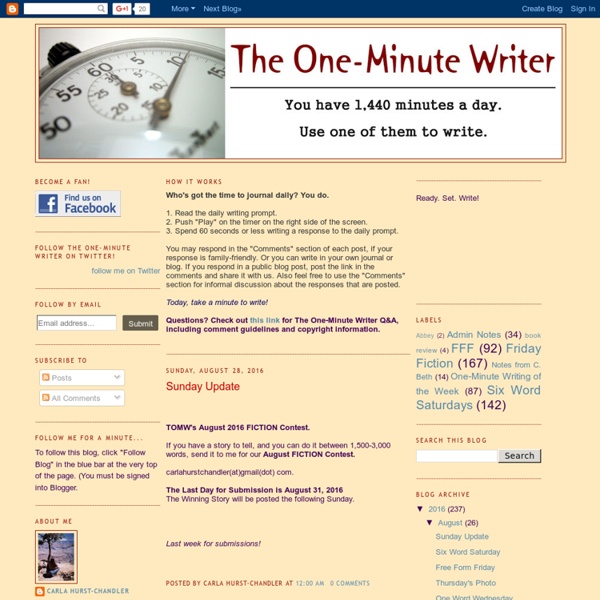



Creative Writing Prompts Write a scene that includes a character speaking a different language, speaking in a thick accent, or otherwise speaking in a way that is unintelligibe to the other characters. (Note: You don't necessarily need to know the language the character is speaking—be creative with it!) Describe a character's reaction to something without explaining what it is. See if your fellow prompt responders can guess what it is. Write a story or a scene about one character playing a prank on another. Writing Prompt: Write a story that involves confusion over homonyms (words that have the same spelling but different meanings) or homophones (words that sound the same but are spelled differently). For World Storytelling Day, share the best story you've ever heard or told by word of mouth, or have a fictional character recount their favorite story. You're making your way down a cobbled street when a stocky, red-bearded man beckons you into an alley. Consider your handwriting, or a character's handwriting.
Suggestions for 10-Minute Writing Exercises Sometimes you wake up and the creative wellsprings are dribbley and dry. Sometimes your project (if you currently have one) feels as appealing as the sweaty insoles of your old gym shoes. You could put your feet back in there, but yuck. Sometimes your feet want to just run free and naked on a sandy beach, in slow motion, with the man of your dreams their dreams? I'm confused running towards you them? Okay, then. And some are courtesy old Dribbley-and-Dry me. Suggestions for 10-Minute Writing Exercises Write three 3-minute stories (use a timer, starting exactly when the timer starts and stopping exactly when the timer stops). Write about the time you were most frightened. Choose any two of the following lines. "Me," she thought, "pick me." Choose a different color each day. Try writing right when you wake up, without getting out of bed, without talking to anyone or reading anything. What’s the worst job you can think of? Write a list of seven words you like. What is your favorite flavor?
Common Core Argument/Opinion Writing Annotated samples of real student work from around the country. This Common Core instructional resource will help educators and students develop a clearer understanding of effective writing as described in the Standards and provides examples of writing integrated within the curriculum. This section focuses on CCSS.W.1: "Write arguments to support claims in an analysis of substantive topics or texts using valid reasoning and relevant and sufficient evidence." Grades K-5, On-Demand Writing Common Core writing samples showing student responses to the same prompt across grade levels. Prompts and source texts included. Brief User Guide for On-Demand Argument/Opinion Writing Defines On-Demand writing and explains how these samples were collected and organized. 1-pg doc. Go to Resource Grade K, Prompt for Opinion Writing Go to Resource Grade K Fall Sample, The Best Pet Go to Resource The Best Pet (Original Student Work) Go to Resource Grade K Spring Sample, Dog is the Best Go to Resource Go to Resource
creative writing prompts . com ideas for writers Pros and Cons of Cell Phones Like many technologies, cell phones are mixed blessings. They keep us from being stranded for hours on the side of the road, but can be distracting while driving, which may lead to accidents -- although you can, at least, call emergency services immediately with your cell phone if the distraction led to the accident. Cell phones have affected our lives to the extent that local and state governments change and create laws regarding cell-phone use to try to moderate the negative features and accentuate the positive. Pro: Keep in Touch Did you forget to tell your husband to pick up milk on his way home from work? No problem -- just call him on his cell phone. Con: Keep in Touch Although keeping in touch seems positive, there's a dark side to it as well. Pro: Saving Money Many cell-phone plans include free features, such as long distance and a certain number of free text messages. Con: Spending Money Con: Safety There are several safety issues associated with cell-phone use. About the Author
Photo Prompts A Simple, Two-Paragraph Template that Helps Kids to Really Argue - Dave Stuart Jr. In the last post, I shared the new argumentative focus I’m experimenting with for the article of the week (AoW) assignment. Rather than choosing just any type of article, I’m looking for articles that argue. (By the way, in case you aren’t aware of this, Kelly Gallagher is the person from whose work I first learned about AoWs. More of his work is here. It’s not exactly the discovery of the polio vaccine, but still, it’s pretty cool. I like this new focus because one of my key hopes for AoW is that my kids won’t merely become aware of something that’s happening in the world–like, in last week’s article, the growing popularity of largely unregulated e-cigarettes–but that they’ll also see current issues as argumentative conversations, held at water coolers and bus stops and in editorial pages and the blogosphere. But I want more than that–I also want each article to allow my students to join in on the conversation. But what scaffolding, you may ask. Here’s the two-paragraph template: